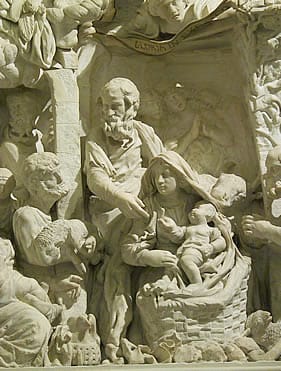«See the Creator of man made man in order that he who governs the world of the stars might suck milk, that bread might be hungry, that the fount might be thirsty, that light might go to sleep, that the way might be tired by the trip, that Truth might be accused by false witnesses, and that the judge of the living and the dead might be examined by a temporal judge and that justice might be condemned by the unjust. That discipline might be lashed by a whip, that the bunch of grapes might be crowned with thorns, that the foundation stone might be hung on a tree, that virtue might become weak, health wounded, and life itself might die » (Sermo 191,1: PL 38,1010).
Through dialectic, Saint Augustine wants the Christians to rise from the temporal to the eternal, from the visible world to the invisible realm: «Jesus lies on the manger, but he wields the power that governs the world; he nurses at the breast, and he nourishes the angels; he is wrapped in swaddling clothes and he clothes us all with immortality; he feeds and he is adored; he found no place at the inn, and he builds his temples in the hearts of the believers. Strength became weak that weakness might become strong … Thus we kindle our charity so that we may reach eternity ». (Sermo 190,4: PL 38,1009).
Humility of Christ
From one marvel to another, from one paradox to another, Saint Augustine will always end up in the humility of God, which is such a scandal to the pagans: «It is humility itself that hits the pagans. For that reason they insult us and say: What kind of God do you adore, a God who is born? What kind of God do you adore, a God who has been crucified? Christ’s humility displeases the proud; but it pleases you, oh Christian, imitate it; if you imitate it, you will not labor, because he said: Come to me you who are burdened». (Enarrat. in ps. 93,15: PL 37,1204).
The doctrine of humility is the great lesson of the mystery of Bethlehem: «Consider, oh man, what God has become for you; recognize the paramount doctrine of humility even in a child yet unable to speak » (Sermo 188, 3: PL 38,1004).
The Virgin Mother and the jubilant Church
Together with the son of God and his ever Virgin Mother, there is always present in the Augustinian nativity scene the Church, or the entire humankind, which rejoices.
The joy of the birth must spread to everyone: «Let men jump for joy, let women jump for joy; Christ was born a man and born of woman and both sexes are honored in him. Leap about, holy children, who chose Christ, to imitate him in the way of purity; jump for joy, holy virgins; the Virgin has given birth for you to be betrothed to him without corruption. Rejoice, you just, because it is the birthday of him who makes just. Celebrate a feast you weak and sick, because it is the birthday of the Savior. Be happy, oh captives; your redeemer is born. Delight, oh you servants, because the Lord is born. Be glad, oh freemen, because it is the birthday of the Liberator. Let Christians be glad, because Christ is born» (Sermo 184,2: PL 38,996).
Joy, therefore, expresses itself as an irrepressible overflowing in the nativity scene of Saint Augustine for all types of persons. The whole humanity has a part in this joy: «All levels of faithful members contributed to offer to the Head what by his grace they could bring to him» (Sermo 192,2: PL 38,1012).
Epiphany of the Lord
Although we reserve the term Epiphany at present to the feast of the Magi, in the beginning it comprised the two feasts of Jesus’ birth and the adoration of the Magi, because «the two days belong to the manifestation of Christ» (Sermo 204,1: PL 38,1037). First, he was manifested in the flesh to the Jews, and later to the Gentiles, represented by the Magi from the East. From then on, the newborn started to be the foundation stone of the prophecy whereby the two walls are joined, the Jews and the Gentiles.
The great paradoxes of Bethelehem continue in this mystery: «Who is this King so small and yet so great, who has not yet opened his mouth on earth and yet is already proclaiming edicts in heaven? (Sermo 199,2: PL 38,1027). The mystery of the God-Child is enriched in new light: «He lay in the manger, and he attracted the Magi from the East; he was hidden in a stable, and thus this day would be called Epiphany, which means manifestation; with that he recommends his greatness and humility, so that he who was clearly indicated by the opened heavens would be sought and found in the narrownes of the stable, and the powerless in the infant members, wrapped in infant clothes, would be adored by the Magi and feared by evil men» (Sermo 220,1: PL 38,1029).


